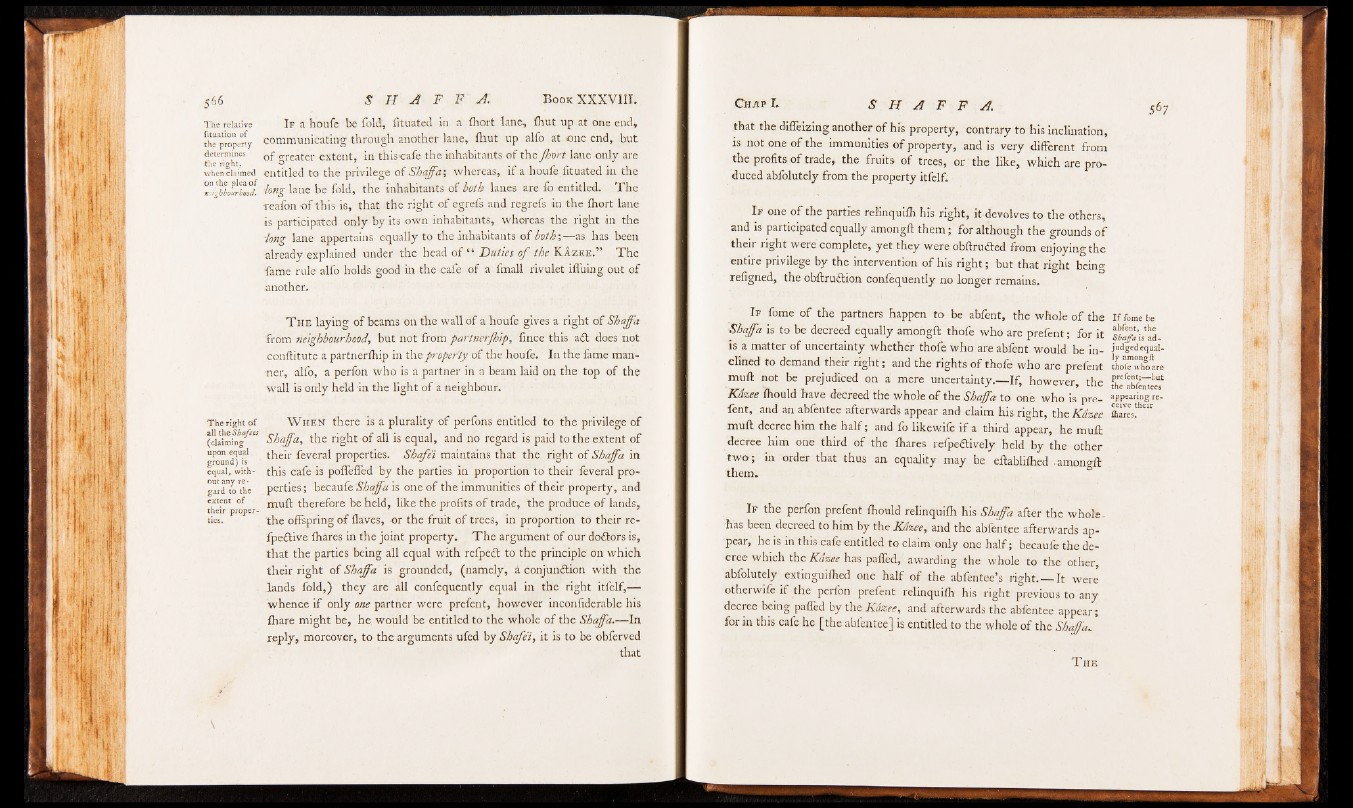
The relative
fituation of
the property
determines ■
the right,
when claimed
on the plea o f
neighbourhood.
T h e right o f
all the Sbafees
(claiming
upon equal
ground) is
equal, without
any regard
to the
extent o f
their properties.
If a houfe be fold, fituated in a fhort lane, Shut up at one end,
communicating through another lane, fhut up alfo at one end, but
o f greater extent, in thiscafe the inhabitants of the Jhort lane only are
entitled to the privilege of Shaffa^ whereas, if a houfe fituated in the
•long lane be fold, the inhabitants of both lanes are fo -entitled. The
reafon ofthis is, that the right of egrefs and regrefs in the ihort lane
is participated only by its own inhabitants, whereas the right in the
long lane appertains equally to the inhabitants of both-,— as, has been
already explained under the head of “ Duties o f the K a z e e . ” The
fame rule alfo holds good in the cafe of a fmall rivulet iffuing out of
another.
T h e laying of beams on the wall of a houfe gives a right of Shaffa
from neighbourhood, but not from partnerjhip, fince this aft does hot
conftitute a partnerfhip in the property of the houfe. In the fame manner,
alfo, a perfon who is a partner in a beam laid on the top of the
wall is only held in the light of a neighbour.
W h e n there is a plurality o f perfons entitled to the privilege of
Shaffa, the right of all is equal, and no regard is paid to the extent of
their feveral properties. Shafei maintains that the right of Shaffa in
this cafe is poffeffed by the parties in proportion to their feveral properties
; becaufe Shaffa is one of the immunities of their property, and
muft therefore be held, like the profits of trade, the produce of lands,
the offspring of flaves, or the fruit of trees, in proportion to their re-
fpeftive fhares in the joint property. T h e argument of our dodtors is,
that the parties being all equal with refpect to the principle on which
their right of Shaffa is grounded, (namely, a conjunction with the
lands fold,) they are all confequently equal in the right itfelf,—
whence if only one partner were prefent, however inconfiderable his
fhare might be, he would be entitled to the whole of the Shaffa.— In
reply, moreover, to the arguments ufed by Shafei, it is to be obferved
that
that the diffeizing another of his property, contrary to his inclination,
is not one of the immunities of property, and is very different from
the profits of trade, the fruits of trees, or the like, which are produced
abfolutely from the property itfelf.
If one of the parties relinquifh his right, it devolves to the others,
and is participated equally amongft them; for although the «rounds of
their right were complete, yet they were obftruCted from enjoying the
entire privilege by the intervention of his right; but that right bein°-
refigned, the ohftrudion confequently no longer remains.
If fome of the partners happen to be abfent, the whole of the
Shaffa is to be decreed equally amongft thofe who are prefent; for it
is a matter of uncertainty whether thofe who are abfent would be inclined
to demand their right; and the rights of thofe who are prefent
muft not be prejudiced on a mere uncertainty.—If, however, the
Kazee fhould have decreed the whole of the Shaffa to one who is prefent,
and an abfentee afterwards appear and claim his right, the Kazee
muft decree him the half; and fo like wile if a third appear, he muft
decree him one third of the lhares refpeftively held by the other
two; in order that thus an equality may be eftablifhed amono-ft
them. °
If the perfon prefent Ihould relinquifh his Shaffa after the whole -
has been decreed to him by the Kazee, and the abfentee afterwards appear,
he is in this cafe entitled to claim only one half; becaufe the decree
which the Kdzee has paffed, awarding the whole to the other,
abfolutely extinguifhed one half of the abfentee’s right.—It were
otherwife if the perfon prefent relinquifh his right previous to any
decree being paffed by the Kdzee, and afterwards the abfentee appear;
for in this cafe he [the abfentee] is entitled to the whole of the Shaffa*
I f fome be
abfent, the
Shaffa is ad -
judged equally
amongft
thofe who are
prefent;— but
the abfentees
appearing receive
their
lhares.